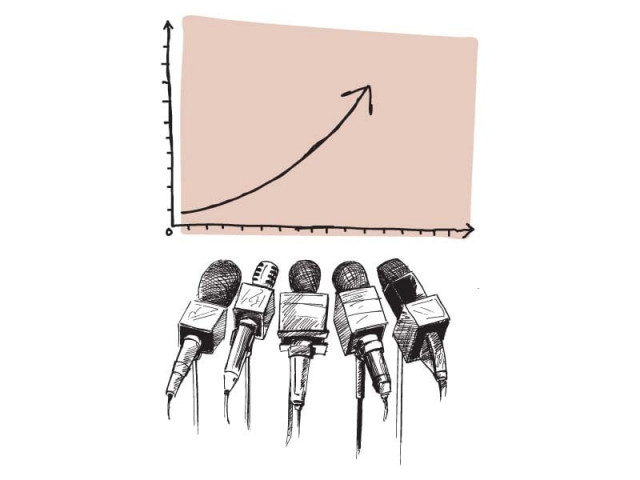Dar defends policy to curb imports
Inflationary pressures to persist; reading may range from 34-36%, says ministry

As an official report sees no decline in inflation and tough economic conditions, Finance Minister Ishaq Dar said on Tuesday that his choice was restricted to curbing imports for saving forex reserves and timely repayment of foreign debt.
Dar spoke about his limited options the day the Ministry of Finance released its monthly economic outlook, which stated that inflationary pressures continued in May and inflation may remain in the range of 34-36%.
Speaking to a delegation of business community, the finance minister defended his decision to reduce imports, which not only grounded the economy but also contributed to high inflation.
The choice was to keep oversight over imports to save foreign exchange and make timely payment of foreign debt, said Dar.
His statement came following criticism that the government’s mismanagement caused more economic losses and fuelled inflation.
The government claimed that in the outgoing fiscal year, the economy grew 0.3%, although the figure is not independently verifiable. The sluggish growth is attributed to curbs on imports that led to the closure of factories and shortage of goods.
The finance ministry’s report underlined that large-scale manufacturing activity was recorded below its natural capacity level since the start of FY23 owing to the necessary policy measures to cool down the overheated economy and to avoid default on external liabilities.
The report stated that downside risks pertaining to supply disruptions, inflationary pressures, synchronised policies, and high base effects continued to prevail, which would have an impact on the LSM output in the coming month.
Dar said that the wheel of economy was sluggish, which had reduced economic activity and claimed that the steep slide of the economy had been largely arrested.
He, however, reiterated that the country would not default. “Our sovereign payments are being made on time and this is disappointing the internal and external enemies,” the minister said, adding that Pakistan would escape the crisis.
Because of currency devaluation, shortage of goods and administered increase in prices, the inflation skyrocketed to 36.4% in April.
In its monthly outlook, the economic advisory wing of the Ministry of Finance stated “inflationary pressure in May 2023 is expected to continue as observed in the month of April”.
The potential reasons for the rising price level were flood damages, disruptions in supply chains, devaluation brought by the macroeconomic imbalances and political uncertainty, it added.
Inflation in May 2023 may remain in the range of 34-36%, according to the ministry’s forecast.
It stated that Pakistan’s economy experienced 0.29% provisional GDP growth on account of many challenges emanating from an uncertain external and domestic economic environment.
Despite monetary tightening, the challenges triggered CPI inflation that remained on a higher trajectory primarily due to the rupee depreciation, the ministry added.
It hoped that inflation may recede after an improvement in the global supply chain that would ease domestic prices in the coming months. However, similar expectations did not turn out to be true in the past.
It also voiced hope that a favourable international commodity price outlook was expected to offset the negative impact of currency depreciation. In addition, a better crop outlook due to timely measures and expected political stability would help to achieve price stability.
However, due to an ongoing crackdown against the Pakistan Tehreek-e-Insaf (PTI) and the upcoming general elections, there seem to be less chances of political stability returning soon.
The ministry claimed that fiscal consolidation during the outgoing year supported economic sustainability. However, this is contrary to the fact as the ministry has issued more than Rs650 billion in supplementary grants.
It noted that there were certain downside risks to the fiscal sector towards the end of the current fiscal year. These risks may emerge due to higher-than-expected expenditures mainly owing to the rise in debt servicing costs and higher expenditures for flood rehabilitation activities.
Similarly, on the revenue side, tax collection increased by 16.1% in July-April compared to nearly 37% nominal GDP growth. The slowdown in economic activity and import compression “explain a substantial portion of the lower-than-expected tax revenue”, it added.
Commenting on the external sector, the ministry stated that the cyclical position in Pakistan’s main export markets had been showing some signs of stability since January 2023.
For the remaining months, according to the ministry, it is expected that exports and imports will follow the subdued trend pattern, as observed during the second half of current fiscal year.
It added that the current account deficit was expected to remain in sustainable limit, which was recorded at $3.2 billion in the first 10 months of current fiscal year.
Published in The Express Tribune, May 31st, 2023.
Like Business on Facebook, follow @TribuneBiz on Twitter to stay informed and join in the conversation.



















COMMENTS
Comments are moderated and generally will be posted if they are on-topic and not abusive.
For more information, please see our Comments FAQ